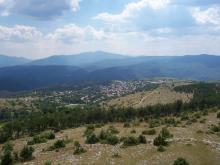Vladimir Zhobov

When the investigator’s words are transcribed in brackets, it means they do not appear on the audio but are rather reconstructed to recreate the sense of the original conversation. These words appear in English translation only in Glossed View, in both English and Bulgarian in Line View, and in Bulgarian only in Cyrillic Line View
| and | other sg n adj | what sg n interr |
| disc | at | threshing.field sg m | morning sg f def med | arise 2sg pres I | early adv |
| arrange 2sg pres I | sheaf pl m def | at | threshing.field sg m def | acc 3pl clt | put 2sg pres I | spread 2sg pres I | acc 3pl clt | nicely adv |
| and | harness 2sg pres I | ox m pl | interr clt | fut | 3sg pres cop clt | horse pl m | interr clt | fut | 3sg pres cop clt |
| donkey pl n | interr clt | fut | 3sg pres cop clt | what sg n interr | comp | 3sg pres cop clt | what sg n rel | have 2sg pres I | for.example adv | animal sg n |
| acc n 3sg clt | harness 2sg pres I | and | begin 2sg pres I | comp | drive 2sg pres I | at | threshing.field sg m | comp | acc n 3sg clt | thresh 2sg pres I |
| and | comp | acc refl clt | and | when conj | acc refl clt | thresh 3sg pres P | and | after adv | straw sg f def | shove.in 2sg pres I |
| in | loft sg f def | comp | acc n 3sg clt | say 1pl pres P | after | this sg n adj | gather 2sg pres I | grain sg n def | in | pile sg m def |
| winnow 2sg pres I | acc n 3sg clt | and | begin 2sg pres I | already adv | as.much rel | 3sg pres cop clt | acc n 3sg clt | transfer 2sg pres I |
| and | acc n 3sg clt | put 2sg pres I | in | barn sg m def | and | this sg n med adj | 3sg pres cop clt | other sg n adj | what sg n interr |
|
|
| acc n 3sg clt | harness 2sg pres I | and | acc n 3sg clt | harness 2sg pres I | all adv | dat refl clt | 3sg pres cop clt | one sg n adj |
| harness 2sg pres I |
| some pl adj | thus med adv | but | some sg m adj | acc n 3sg clt | again adv | say 3sg pres I | fut | acc n 3sg clt | harness 3sg pres I |
| but | more adv | fut | acc n 3sg clt | harness 2sg pres I | say 3pl pres I |
| livestock sg m def | acc m 3sg clt | harness 2sg pres I | in | threshing.field sg m def | and | begin 2sg pres I |
|
|
| nom 1sg | neg | 1sg pres aux clt | plant sg m L.part I | and | vineyard sg n | not.have 1sg pres I | such pl med adj | thing pl f |
| neg | 1sg pres aux clt | plant sg m L.part I | see sg imv P | if conj | pres exist | grapes sg n | comp | bite 1pl pres P |
| or | something sg n | wine sg n | comp | drink 1pl pres I | fut | drink 1pl pres I | if conj | no | not.have 1pl pres I |
| here adv | not.have 1pl pres I | vineyard sg n |
Text copyright © 2011-2016 Ronelle Alexander and Vladimir Zhobov. Texts and other parts of the website may be copied only for non-commercial, research, or educational purposes, provided the source of the material is cited accordingly. Cited material may not include the entire website or substantial portions thereof.
Comments and questions may be addressed to bdlt@berkeley.edu.
Recommended Model for Citations
Bulgarian Dialectology as Living Tradition [2016] (http://www.bulgariandialectology.org, visited on 1 March 2016)
Babjak 1: 13-15. In: Bulgarian Dialectology as Living Tradition [2016] (http://www.bulgariandialectology.org, visited on 1 March 2016)